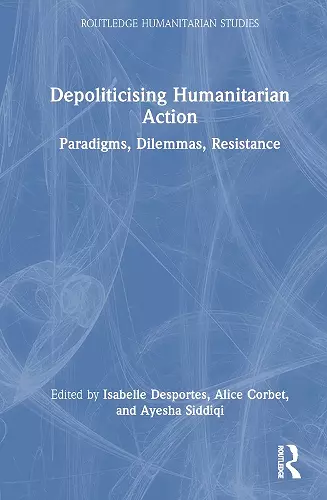Depoliticising Humanitarian Action
Paradigms, Dilemmas, Resistance
Ayesha Siddiqi editor Isabelle Desportes editor Alice Corbet editor
Format:Hardback
Publisher:Taylor & Francis Ltd
Published:12th Sep '24
Currently unavailable, and unfortunately no date known when it will be back
This hardback is available in another edition too:
- Paperback£38.99(9781032535098)

Is it ever possible to separate humanitarian action from politics? Drawing on the experience of both practitioners and researchers, this book is an essential guide to the thorny interplay between what are too often considered as separate worlds.
The humanitarian sector aims to separate its work from politics, arguing that independence and neutrality are essential in order to gain entry into disaster and conflict settings. Yet, humanitarian claims of non-involvement in politics have also been dismissed as misleading, naive, or counter-productive. In practice, humanitarians find themselves working within political settings on a daily basis. This book investigates the theory behind depoliticisation, the political background and context behind humanitarian action, and the daily dilemmas faced by practitioners walking that fine line between principles and pragmatism. Finally, this book considers the importance of decolonising mainstream understandings of humanitarianism and politics, and of placing understandings from the Global South at the heart of the discussion.
Balancing theoretical insights with empirical grounding, field examples, and recommendations for policy and practice, this book is perfect for researchers and students in humanitarian studies, political science, international relations, human rights, development studies, disaster studies, and peace and conflict studies, as well as humanitarian practitioners and policy makers.
A long time ago, when the all-out war against the Moro Islamic Liberation Front was raging in Central Mindanao in my own country, the Philippines, I asked a displaced woman what she needed. My pen was poised to check water, food, shelter on the needs assessment sheet. Peace, she said. Peace and justice. These were not on my list, but these were the answers that really mattered. Now, this book asks humanitarians: How can we really address suffering and deprivation, indignity and insecurity? Given what’s incessantly on the headlines during this ‘Age of Crisis’, I was going to say how timely. Yet this isn’t a new question. It has been there all this time, just somehow always conveniently parked. The book urges courage to confront the reality of the humanitarian aid industry and boldness to change it.
Lan Mercado, former Asia Regional Director and Co-Director for Strategy and Feminist Futures at Oxfam
It is not easy to openly reflect on something actors don’t see, don’t want to or pretend not to see. The fact that humanitarian action is immersed in politics can remain unrecognized – often on purpose - by the very people involved in the game. Yet this book has successfully taken up the challenge. It confronts the lived experiences of a wide range of humanitarians who work in paradigms that are seemingly depoliticised – which can be immensely important for realizing their humanitarian task. The book zooms in on how they navigate the associated dilemmas, resist depoliticised approaches, or, as is often the case in real life, engage in a combination of those. What makes this volume extra precious is the diversity of authors that speak from their own environments and perspectives, weaving together theoretical insights and case studies ranging from the Colombian highlands to street protests in Hong Kong. This makes the book a highly engaging read for scholars, humanitarian leaders and field staff alike. Ultimately, the book contributes to a more multi-faceted and nuanced understanding of the politics of humanitarian action.
Dorothea Hilhorst, Professor of Humanitarian Studies at the International Institute for Social Studies of Erasmus University in The Hague
The humanitarian enterprise has long misrepresented itself as apolitical while internalizing a belief that the depoliticization of aid is essential to achieving its humanitarian goals. Grounded in both academic research and practitioners’ perspectives, the chapters in this book paint an essential picture not simply of humanitarian action as deeply political, but of how this depoliticizing narrative undermines its objectives and delivers harm along with the good stuff.
Marc DuBois, Senior Fellow, Department of Development Studies SOAS, University of London, former General Director Médecins Sans Frontières UK and Ireland
The book makes an important contribution to academic literature as well as to practitioners’ debates, which focus on humanitarian politics and the related resistance, dilemmas, and ruptures. By looking at depoliticization itself as a form of politics, the well-selected contributions illustrate what depoliticization means and implies in the humanitarian context.
Antonio De Lauri, Research Professor at the Chr. Michelsen Institute and President of the International Humanitarian Studies Association
ISBN: 9781032535104
Dimensions: unknown
Weight: 453g
262 pages